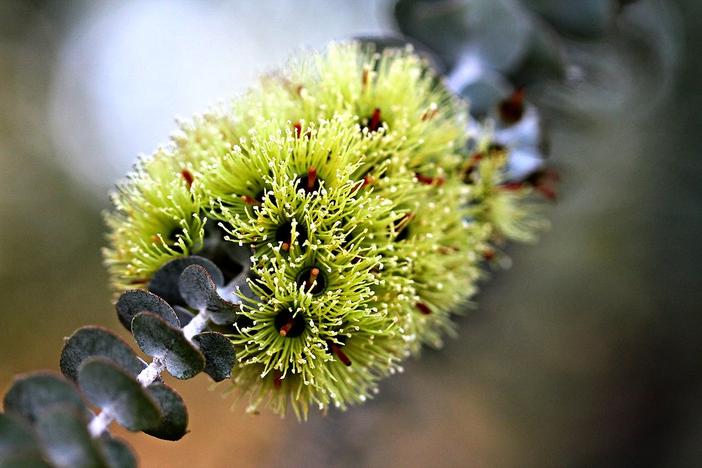Book-Leaf Mallee
(Eucalyptus kruseana)
Book-Leaf Mallee (Eucalyptus kruseana)
/
/

Renee Grayson
CC BY 2.0
Image By:
Renee Grayson
Recorded By:
Copyright:
CC BY 2.0
Copyright Notice:
Photo by: Renee Grayson | License Type: CC BY 2.0 | License URL: https://creativecommons.org/licenses/by/2.0/ | Uploader: Monkeystyle3000 | Publisher: Flickr








Estimated Native Range
Summary
Eucalyptus kruseana, commonly known as Book-leaf Mallee, is a small, multi-stemmed eucalyptus tree with a mallee growth habit, native to semi-arid regions on plains and slopes in Western Australia. It is well-adapted to its native habitat, thriving in well-drained, sandy or rocky soils. This species typically grows to a height of 2–3.5 m (6 ft 7 in – 11 ft 6 in) and is notable for its smooth coppery to dark grey bark that peels away in ribbons, contrasting with the rough, fibrous bark near the base. The crown is dense with sessile, blue-green juvenile leaves that give the tree a distinctive, compact appearance.
Book-leaf Mallee is valued for its ornamental features, including the glaucous flower buds and striking greenish-yellow flowers that bloom mainly from June to September, with sporadic flowering observed in February, March, and May. The flowers are not particularly showy but add a subtle charm to the garden. After flowering, it produces barrel-shaped to cup-shaped, woody capsules. The white, waxy branchlets add to its unique texture. Gardeners appreciate this tree for its drought and frost tolerance, making it suitable for xeriscaping. It is often used for privacy screening, shade, hedging, or as a feature plant in both small and large gardens. It can withstand hard pruning, which allows gardeners to shape it as desired. For optimal growth, it requires full sun exposure and soils with medium to fast drainage, with low water requirements once established.CC BY-SA 4.0
Book-leaf Mallee is valued for its ornamental features, including the glaucous flower buds and striking greenish-yellow flowers that bloom mainly from June to September, with sporadic flowering observed in February, March, and May. The flowers are not particularly showy but add a subtle charm to the garden. After flowering, it produces barrel-shaped to cup-shaped, woody capsules. The white, waxy branchlets add to its unique texture. Gardeners appreciate this tree for its drought and frost tolerance, making it suitable for xeriscaping. It is often used for privacy screening, shade, hedging, or as a feature plant in both small and large gardens. It can withstand hard pruning, which allows gardeners to shape it as desired. For optimal growth, it requires full sun exposure and soils with medium to fast drainage, with low water requirements once established.CC BY-SA 4.0
Plant Description
- Plant Type: Tree
- Height: 9-15 feet
- Width: 6-10 feet
- Growth Rate: Moderate
- Flower Color: Yellow
- Flowering Season: Fall, Winter
- Leaf Retention: Evergreen
Growth Requirements
- Sun: Full Sun
- Water: Low
- Drainage: Medium, Fast
Common Uses
Bee Garden, Bird Garden, Butterfly Garden, Drought Tolerant, Fragrant, Hummingbird Garden, Low Maintenance
Natural Habitat
Native to semi-arid regions on plains and slopes in Western Australia
Other Names
Common Names: Kruse’s Mallee
Scientific Names: , Eucalyptus kruseana, Eucalyptus morrisonii,
GBIF Accepted Name: Eucalyptus kruseana F.Muell.